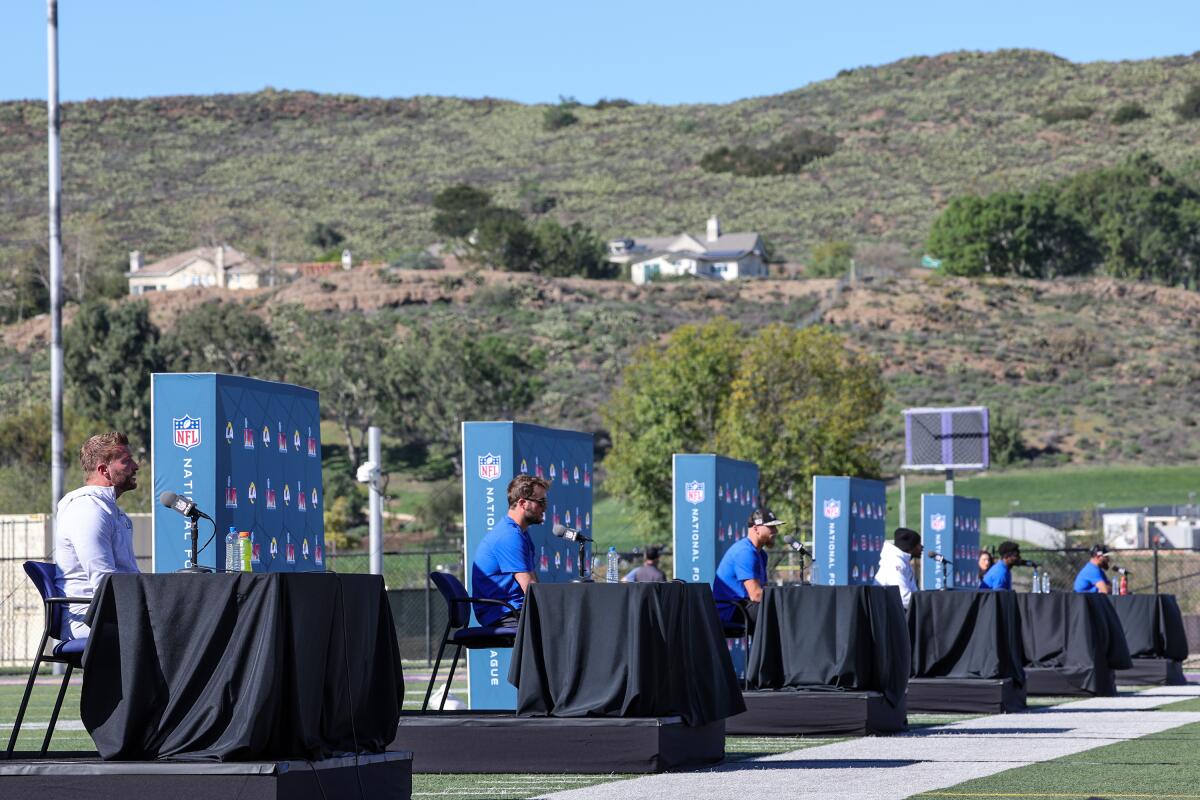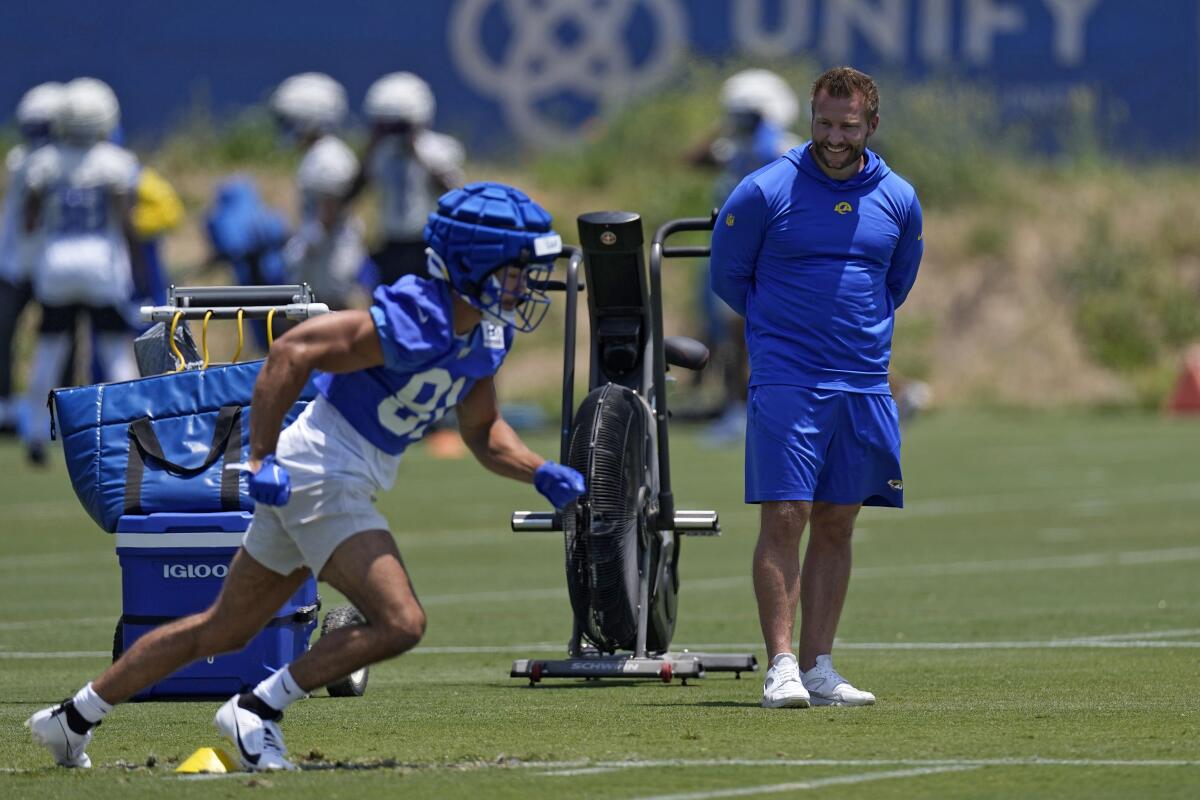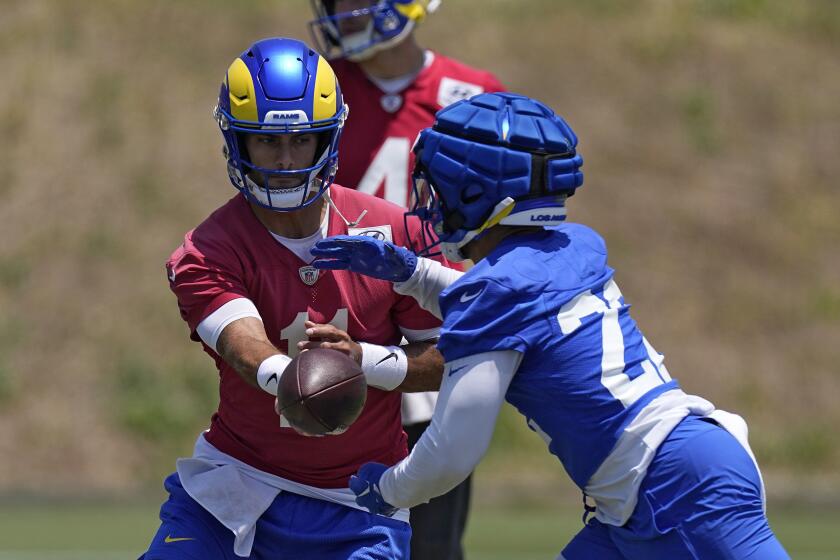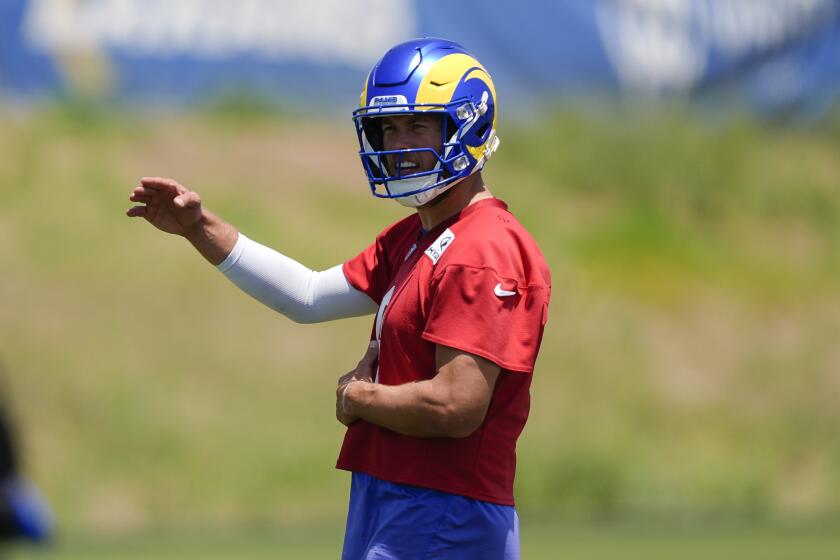Rams wave goodbye to their Cal Lutheran era, say hello to camp at LMU

- Share via
It was supposed to be a temporary home for the Rams, a few-years-at-most stopover for the NFL team before moving into a new permanent facility at a location to be determined.
Nearly a decade, two Super Bowl appearances and one championship later, the Rams will be on the field for the final time at Cal Lutheran in Thousand Oaks on Tuesday when they conclude their offseason program with a walk-through.
In August, after conducting training camp at Loyola Marymount, the Rams will not return to what essentially has been a trailer park of 75 adjoined and retrofitted modular buildings in Ventura County. Instead, they will set up another temporary facility in Woodland Hills on the site that one day will be home to their permanent headquarters.
In a statement, Cal Lutheran said it was “pleased” to have been the Rams’ practice home and that students benefited from internships with the team, classes led by Rams professionals, and other school and community outreach.
In 2018, a Cal Lutheran choir sang the national anthem before a “Monday Night Football” game against the Kansas City Chiefs. The choir dedicated its performance to alumnus Justin Meek, who died in the Borderline Bar and Grill shooting that year.
“We thank the Rams for their support of the Cal Lutheran community and the relationships we have developed with them,” the school said.
The former Michigan star has been a humble student of the game and has been “growing every single day,” according to running backs coach Ron Gould.
Rams President Kevin Demoff echoed Cal Lutheran about the relationship and highlighted the choir’s performance alongside first responders.
“Showing the world resilience, strength and the power of community,” Demoff said in a statement. “Thank you to the CLU community for making us feel at home and helping us make history.”
The Rams’ Thousand Oaks residence began in 2016 when the franchise returned to Southern California after more than two decades in St. Louis. They erected a nondescript 53,000 square-foot facility and built two fields with a plan to stay for three or four years.
That timeline mirrored projections for when construction of SoFi Stadium — and the Rams’ search for a separate site to build a permanent home for its football and business operations — would be completed.
The Rams played games at the Los Angeles Memorial Coliseum through the 2019-20 season, however. Owner Stan Kroenke did not purchase the Woodland Hills property until 2022.
Meantime, in the multibillion-dollar business that is the NFL, the Rams have prospered despite their spartan facility, which pales compared with those of most other teams.

“We’ve got what we need here,” coach Sean McVay said in 2019.
In a 2024 survey of players conducted by the NFL Players Assn., the Rams ranked 20th among 32 teams in 11 categories that included, among others, dining, locker room and training facilities and coaching and ownership.
“The strong grades for the staff — the players grade McVay very highly — ‘cover’ for the lower grades for the facilities. Respondents also think highly of both their training staff and strength coaches,” the union said on its website.
However, offensive lineman Rob Havenstein, a 10th-year pro who has been with the team since it returned to Los Angeles, said posh facilities “equates to zero” on the football field.
“It’s all kind of window dressing,” Havenstein said recently. “It’s the people in the building — the players, the coaches, the staff and the relationships you build.
After years training at UC Irvine, the Rams have moved the camp this summer to Loyola Marymount. Meanwhile, Matthew Stafford’s contract is still a topic.
“We can get just as much done in a roof that leaks every time it rains then if it doesn’t leak. As soon as it starts raining, buckets come out and, OK, you’ve got some wet spots. You work around it.
“If anything it gives you more resilience about going through your regular day.”
Under McVay, the Rams have made five playoff appearances in seven seasons. In 2018, they advanced to Super Bowl LIII. In 2021, they won Super Bowl LVI at SoFi Stadium.
McVay last month joked in a television interview that he has longed for a simple luxury: a window in his office.
Don’t be fooled, however: The maniacally focused McVay loves not having to deal with distractions at work, even pleasant ones.
While football operations staff and executives, including general manager Les Snead and vice president Tony Pastoors, will move to Woodland Hills, the business side will continue to work out of offices in Agoura Hills. Eventually, all Rams football and business staff will work from Woodland Hills.
MLB should be paying close attention to a trial in which the NFL is the primary defendant against allegations that its Sunday Ticket package violates antitrust law.
Relocation to the San Fernando Valley is only one of the moves the Rams will make before opening the season on Sept. 8 against the Detroit Lions in Detroit.
After conducting training camp at UC Irvine since 2016 — and staying in a luxury hotel the last few years — the Rams will report to Loyola Marymount in late July. They will once again be housed in dorms.
“Done it in college, done it in the pros,” Havenstein said, “so it’s not going to be that big a deal.”
Star receiver Cooper Kupp said he “loved” the set-up at Irvine, but does not mind the move.
“It’s a new thing,” Kupp said. “New can sometimes be good.”
More to Read
Go beyond the scoreboard
Get the latest on L.A.'s teams in the daily Sports Report newsletter.
You may occasionally receive promotional content from the Los Angeles Times.










